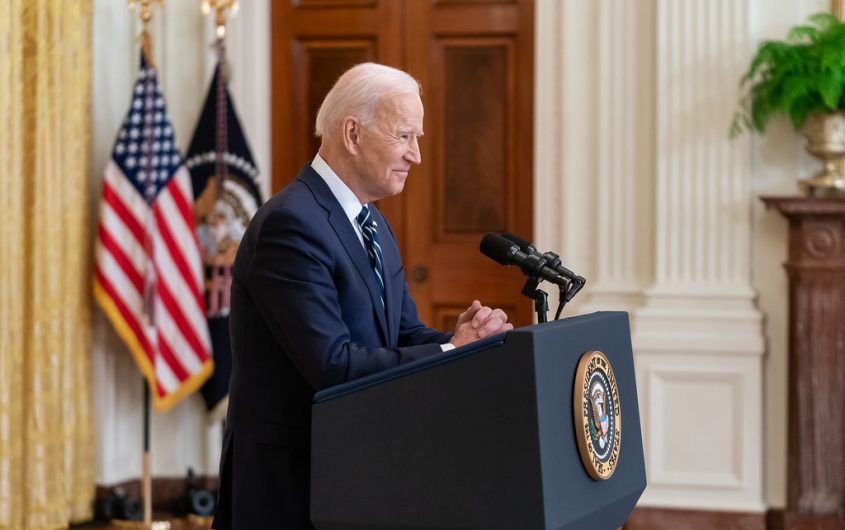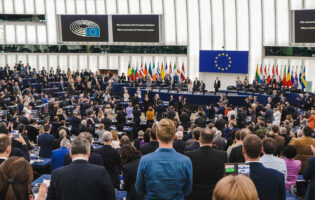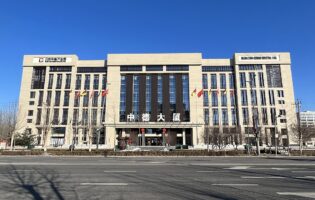
via Flickr
Revoking Russia’s Trade Privileges

Peter S. Rashish
Vice President; Director, Geoeconomics Program
Peter S. Rashish, who counts over 30 years of experience counseling corporations, think tanks, foundations, and international organizations on transatlantic trade and economic strategy, is Vice President and Director of the Geoeconomics Program at AICGS. He also writes The Wider Atlantic blog.
Mr. Rashish has served as Vice President for Europe and Eurasia at the U.S. Chamber of Commerce, where he spearheaded the Chamber’s advocacy ahead of the launch of the Transatlantic Trade and Investment Partnership. Previously, Mr. Rashish was a Senior Advisor for Europe at McLarty Associates, Executive Vice President of the European Institute, and a staff member and consultant at the International Energy Agency, the World Bank, UNCTAD, the Atlantic Council, the Bertelsmann Foundation, and the German Marshall Fund.
Mr. Rashish has testified before the House Financial Services Subcommittee on International Monetary Policy and Trade and the House Foreign Affairs Subcommittee on Europe and Eurasia and has advised three U.S. presidential campaigns. He has been a featured speaker at the Munich Security Conference, the Aspen Ideas Festival, and the Salzburg Global Seminar and is a member of the Board of Directors of the Jean Monnet Institute in Paris and a Senior Advisor to the European Policy Centre in Brussels. His commentaries have been published in The New York Times, the Financial Times, The Wall Street Journal, Foreign Policy, and The National Interest, and he has appeared on PBS, CNBC, CNN, and NPR.
He earned a BA from Harvard College and an MPhil in international relations from Oxford University. He speaks French, German, Italian, and Spanish.
The System Worked
Last Friday, the G7 and the European Union decided to revoke Russia’s “most favored nation” (MFN) status, or what is called “Permanent Normal Trade Relations” in the United States, over its invasion of Ukraine. After finance (economic sanctions) now trade policy has been called upon in an unprecedented way on behalf of geopolitics.
Under MFN, World Trade Organization members agree to grant each other the same low-tariff access to their markets. But the WTO’s Article XXI on national security exceptions allows the suspension of MFN when there is an “emergency in international relations,” which is clearly the case now. The G7 (the United States, Canada, France, Germany, Italy, Japan, and the UK) and the 27 member countries of the EU who together make up 50 percent of the global economy will now raise their tariffs on imports of Russian goods. On March 3, Canada had already decided to act alone, hiking its duties to 35 percent.
This move has important consequences for the global trading system. One emerging view is that with the temporary suspension of Russia’s trading privileges the “triumphant globalization campaign that began more than 30 years ago has reached a dead end” (The Washington Post) or “Economic Blacklist of Russia Marks New Blow for Globalization” (The Wall Street Journal). Translation: combined with the inevitable decoupling of China’s non-market economy from the rest of the world, the withdrawal of MFN for Russia means that the idea of a rules-based global economy is finished.
The health of the global trading system should not be judged by who is in or out at any given moment—what counts is how strongly its leading members defend and advance its principles.
It is easy to see how this narrative of the disintegration of world trade could take hold. Before its invasion of Ukraine, Russia was the world’s 11th largest economy, with a GDP of approximately $1.5 trillion. Although Russia is only the 23rd largest trading partner of the United States, for the EU it ranks fifth. After China acceded to the WTO 2001, Russia’s membership in 2012 was seen as the last step needed to make trade truly global.
But the health of the global trading system should not be judged by who is in or out at any given moment—what counts is how strongly its leading members defend and advance its principles. Viewed through that prism, the G7 and EU decision on Russia’s MFN status is positive. Rather than being a sign of the global economy’s growing anarchy, revoking Russia’s MFN status strengthens the WTO by demonstrating the proper use of the flexibilities its rules provide to deal with outliers.
But however important the WTO may be, the global trading system isn’t co-terminus with the Geneva-based institution; more informal efforts are increasingly defining its contours. And in that regard, the joint decision by the G7 and the EU has built a coalition of like-minded economies who can work together in the future on both new trade rules—whether within the WTO or for smaller groups of countries—and more flexible trade tools to help enforce these rules when they aren’t respected.
It is unlikely this new G7-EU coalition would have taken shape so quickly had President Biden not first worked to ease several trade conflicts. These include removing the damaging Trump-era tariffs on imports of steel and aluminum from the EU, Japan, the UK, and others, which were imposed by misusing a provision in U.S. trade law. With trust, never underestimate what democracies can achieve in a crisis.









